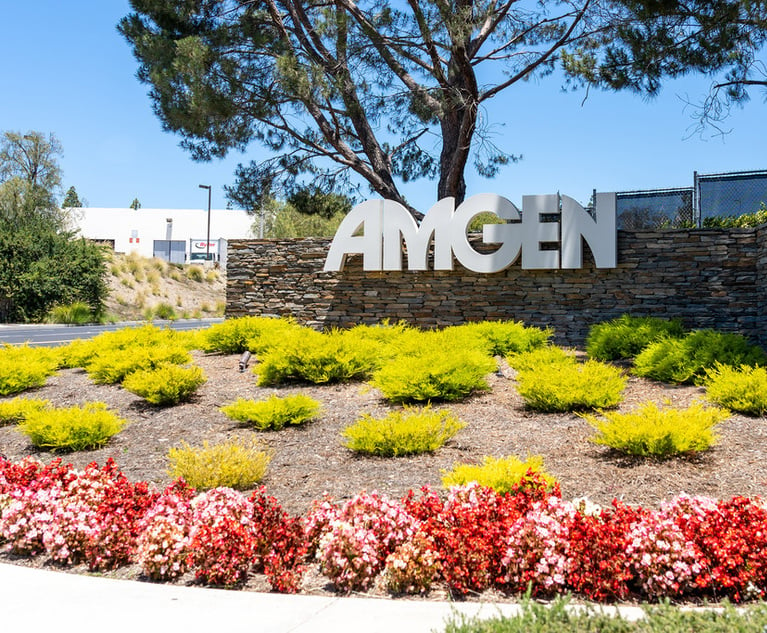 Credit: I Viewfinder/Adobe Stock
Credit: I Viewfinder/Adobe StockFirst-of-Its-Kind Parkinson’s Patch at Center of Fight Over FDA Approval of Generic Version
New Jersey-based pharmaceutical company UCB has sued to protect its patents for a Parkinson’s drug after an India-based company attempted to file an FDA application to create a generic version.
December 26, 2024 at 01:55 PM
3 minute read
New Jersey-based pharmaceutical company UCB has sued to protect its patents for a Parkinson’s drug after an India-based company attempted to file an application to the U.S. Food and Drug Administration to create a generic version.
Takeaway: The lawsuit is an abbreviated new drug application, or ANDA, case, which is a highly active practice in New Jersey and elsewhere. Some claims focus on the timing of a new drug application, but this case includes allegations about access to information, and claims that the defendant company barred the plaintiff's in-house attorneys from accessing the application.
NOT FOR REPRINT
© 2025 ALM Global, LLC, All Rights Reserved. Request academic re-use from www.copyright.com. All other uses, submit a request to [email protected]. For more information visit Asset & Logo Licensing.
You Might Like
View All
AstraZeneca Files Flurry of Lawsuits to Protect Cancer Treatment Drug
3 minute read

Who Got the Work: Saul Ewing Team Appears for Samsung Bioepis in Amgen Patent Case
4 minute read
How Safe Is Cannabis, Really? Here's What Plaintiffs' Attorneys Should Know
8 minute readTrending Stories
- 1OCR Issues 'Dear Colleagues' Letter Regarding AI in Medicine
- 2Corporate Litigator Joins BakerHostetler From Fish & Richardson
- 3E-Discovery Provider Casepoint Merges With Government Software Company OPEXUS
- 4How I Made Partner: 'Focus on Being the Best Advocate for Clients,' Says Lauren Reichardt of Cooley
- 5People in the News—Jan. 27, 2025—Barley Snyder
Who Got The Work
J. Brugh Lower of Gibbons has entered an appearance for industrial equipment supplier Devco Corporation in a pending trademark infringement lawsuit. The suit, accusing the defendant of selling knock-off Graco products, was filed Dec. 18 in New Jersey District Court by Rivkin Radler on behalf of Graco Inc. and Graco Minnesota. The case, assigned to U.S. District Judge Zahid N. Quraishi, is 3:24-cv-11294, Graco Inc. et al v. Devco Corporation.
Who Got The Work
Rebecca Maller-Stein and Kent A. Yalowitz of Arnold & Porter Kaye Scholer have entered their appearances for Hanaco Venture Capital and its executives, Lior Prosor and David Frankel, in a pending securities lawsuit. The action, filed on Dec. 24 in New York Southern District Court by Zell, Aron & Co. on behalf of Goldeneye Advisors, accuses the defendants of negligently and fraudulently managing the plaintiff's $1 million investment. The case, assigned to U.S. District Judge Vernon S. Broderick, is 1:24-cv-09918, Goldeneye Advisors, LLC v. Hanaco Venture Capital, Ltd. et al.
Who Got The Work
Attorneys from A&O Shearman has stepped in as defense counsel for Toronto-Dominion Bank and other defendants in a pending securities class action. The suit, filed Dec. 11 in New York Southern District Court by Bleichmar Fonti & Auld, accuses the defendants of concealing the bank's 'pervasive' deficiencies in regards to its compliance with the Bank Secrecy Act and the quality of its anti-money laundering controls. The case, assigned to U.S. District Judge Arun Subramanian, is 1:24-cv-09445, Gonzalez v. The Toronto-Dominion Bank et al.
Who Got The Work
Crown Castle International, a Pennsylvania company providing shared communications infrastructure, has turned to Luke D. Wolf of Gordon Rees Scully Mansukhani to fend off a pending breach-of-contract lawsuit. The court action, filed Nov. 25 in Michigan Eastern District Court by Hooper Hathaway PC on behalf of The Town Residences LLC, accuses Crown Castle of failing to transfer approximately $30,000 in utility payments from T-Mobile in breach of a roof-top lease and assignment agreement. The case, assigned to U.S. District Judge Susan K. Declercq, is 2:24-cv-13131, The Town Residences LLC v. T-Mobile US, Inc. et al.
Who Got The Work
Wilfred P. Coronato and Daniel M. Schwartz of McCarter & English have stepped in as defense counsel to Electrolux Home Products Inc. in a pending product liability lawsuit. The court action, filed Nov. 26 in New York Eastern District Court by Poulos Lopiccolo PC and Nagel Rice LLP on behalf of David Stern, alleges that the defendant's refrigerators’ drawers and shelving repeatedly break and fall apart within months after purchase. The case, assigned to U.S. District Judge Joan M. Azrack, is 2:24-cv-08204, Stern v. Electrolux Home Products, Inc.
Featured Firms
Law Offices of Gary Martin Hays & Associates, P.C.
(470) 294-1674
Law Offices of Mark E. Salomone
(857) 444-6468
Smith & Hassler
(713) 739-1250






